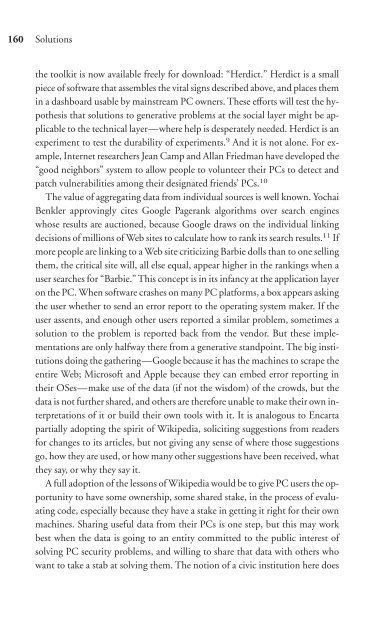Download - Future of the Internet â And how to stop it.
Download - Future of the Internet â And how to stop it.
Download - Future of the Internet â And how to stop it.
You also want an ePaper? Increase the reach of your titles
YUMPU automatically turns print PDFs into web optimized ePapers that Google loves.
160<br />
Solutions<br />
<strong>the</strong> <strong>to</strong>olk<strong>it</strong> is now available freely for download: “Herdict.” Herdict is a small<br />
piece <strong>of</strong> s<strong>of</strong>tware that assembles <strong>the</strong> v<strong>it</strong>al signs described above, and places <strong>the</strong>m<br />
in a dashboard usable by mainstream PC owners. These efforts will test <strong>the</strong> hypo<strong>the</strong>sis<br />
that solutions <strong>to</strong> generative problems at <strong>the</strong> social layer might be applicable<br />
<strong>to</strong> <strong>the</strong> technical layer—where help is desperately needed. Herdict is an<br />
experiment <strong>to</strong> test <strong>the</strong> durabil<strong>it</strong>y <strong>of</strong> experiments. 9 <strong>And</strong> <strong>it</strong> is not alone. For example,<br />
<strong>Internet</strong> researchers Jean Camp and Allan Friedman have developed <strong>the</strong><br />
“good neighbors” system <strong>to</strong> allow people <strong>to</strong> volunteer <strong>the</strong>ir PCs <strong>to</strong> detect and<br />
patch vulnerabil<strong>it</strong>ies among <strong>the</strong>ir designated friends’ PCs. 10<br />
The value <strong>of</strong> aggregating data from individual sources is well known. Yochai<br />
Benkler approvingly c<strong>it</strong>es Google Pagerank algor<strong>it</strong>hms over search engines<br />
whose results are auctioned, because Google draws on <strong>the</strong> individual linking<br />
decisions <strong>of</strong> millions <strong>of</strong> Web s<strong>it</strong>es <strong>to</strong> calculate <strong>how</strong> <strong>to</strong> rank <strong>it</strong>s search results. 11 If<br />
more people are linking <strong>to</strong> a Web s<strong>it</strong>e cr<strong>it</strong>icizing Barbie dolls than <strong>to</strong> one selling<br />
<strong>the</strong>m, <strong>the</strong> cr<strong>it</strong>ical s<strong>it</strong>e will, all else equal, appear higher in <strong>the</strong> rankings when a<br />
user searches for “Barbie.” This concept is in <strong>it</strong>s infancy at <strong>the</strong> application layer<br />
on <strong>the</strong> PC. When s<strong>of</strong>tware crashes on many PC platforms, a box appears asking<br />
<strong>the</strong> user whe<strong>the</strong>r <strong>to</strong> send an error report <strong>to</strong> <strong>the</strong> operating system maker. If <strong>the</strong><br />
user assents, and enough o<strong>the</strong>r users reported a similar problem, sometimes a<br />
solution <strong>to</strong> <strong>the</strong> problem is reported back from <strong>the</strong> vendor. But <strong>the</strong>se implementations<br />
are only halfway <strong>the</strong>re from a generative standpoint. The big inst<strong>it</strong>utions<br />
doing <strong>the</strong> ga<strong>the</strong>ring—Google because <strong>it</strong> has <strong>the</strong> machines <strong>to</strong> scrape <strong>the</strong><br />
entire Web; Micros<strong>of</strong>t and Apple because <strong>the</strong>y can embed error reporting in<br />
<strong>the</strong>ir OSes—make use <strong>of</strong> <strong>the</strong> data (if not <strong>the</strong> wisdom) <strong>of</strong> <strong>the</strong> crowds, but <strong>the</strong><br />
data is not fur<strong>the</strong>r shared, and o<strong>the</strong>rs are <strong>the</strong>refore unable <strong>to</strong> make <strong>the</strong>ir own interpretations<br />
<strong>of</strong> <strong>it</strong> or build <strong>the</strong>ir own <strong>to</strong>ols w<strong>it</strong>h <strong>it</strong>. It is analogous <strong>to</strong> Encarta<br />
partially adopting <strong>the</strong> spir<strong>it</strong> <strong>of</strong> Wikipedia, solic<strong>it</strong>ing suggestions from readers<br />
for changes <strong>to</strong> <strong>it</strong>s articles, but not giving any sense <strong>of</strong> where those suggestions<br />
go, <strong>how</strong> <strong>the</strong>y are used, or <strong>how</strong> many o<strong>the</strong>r suggestions have been received, what<br />
<strong>the</strong>y say, or why <strong>the</strong>y say <strong>it</strong>.<br />
A full adoption <strong>of</strong> <strong>the</strong> lessons <strong>of</strong> Wikipedia would be <strong>to</strong> give PC users <strong>the</strong> opportun<strong>it</strong>y<br />
<strong>to</strong> have some ownership, some shared stake, in <strong>the</strong> process <strong>of</strong> evaluating<br />
code, especially because <strong>the</strong>y have a stake in getting <strong>it</strong> right for <strong>the</strong>ir own<br />
machines. Sharing useful data from <strong>the</strong>ir PCs is one step, but this may work<br />
best when <strong>the</strong> data is going <strong>to</strong> an ent<strong>it</strong>y comm<strong>it</strong>ted <strong>to</strong> <strong>the</strong> public interest <strong>of</strong><br />
solving PC secur<strong>it</strong>y problems, and willing <strong>to</strong> share that data w<strong>it</strong>h o<strong>the</strong>rs who<br />
want <strong>to</strong> take a stab at solving <strong>the</strong>m. The notion <strong>of</strong> a civic inst<strong>it</strong>ution here does


